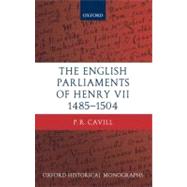The English Parliaments of Henry VII 1485-1504
, by Cavill, Paul- ISBN: 9780199573837 | 0199573832
- Cover: Hardcover
- Copyright: 10/11/2009
Paul Cavill offers a major reinterpretation of early Tudor constitutional history. In the grand 'Whig' tradition, the parliaments of Henry VII were a disappointing retreat from the onward march towards parliamentary democracy. The king was at best indifferent and at worst hostile toparliament; its meetings were cowed and quiescent, subservient to the royal will. Yet little research has tested these assumptions.Drawing on extensive archival research, Cavill challenges existing accounts and revises our understanding of the period. Neither to the king nor to his subjects did parliament appear to be a waning institution, fading before the waxing power of the crown. For a ruler in Henry's vulnerable position,parliament helped to restore royal authority by securing the good governance that legitimated his regime. For his subjects, parliament served as a medium through which to communicate with the government and to shape-and, on occasion, criticize -its policies. Because of the demands parliament made,its impact was felt throughout the kingdom, among ordinary people as well as among the elite. Cooperation between subjects and the crown, rather than conflict, characterized these parliaments.While for many scholars parliament did not truly come of age until the 1530s, when-freed from its medieval shackles-the modern institution came to embody the sovereign nation state, in this study Henry's reign emerges as a constitutionally innovative period. Ideas of parliamentary sovereignty werealready beginning to be articulated. It was here that the foundations of the 'Tudor revolution in government' were being laid.






